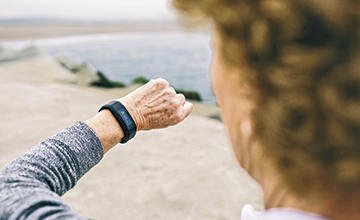By Andria Bianchi
The prevalence of using wearable devices to monitor aspects related to one’s health has increased in recent years. Some devices have functions that are meant to serve specific populations, such as electronic glasses for people with low vision, bionic exoskeleton suits for people with lower extremity weakness, and smartwatches with applications that are used to detect, and potentially predict, seizures.
In addition to devices that are meant to benefit people with particular health conditions, other wearable devices are becoming frequently used among our entire population. The Fitbit is an example of a wearable device that is used by people who want to monitor aspects related to their health, even if they do not necessarily have health concerns that will directly benefit from constant monitoring at the present time. The Fitbit can be used to calculate one’s heart rate, the number of steps that one takes, the amount of time that one exercises, sleeps, etc. Other companies have developed similar products given the increased demand for wearable devices.
Wearable devices may help people who want to be held accountable to someone/something when it comes to managing aspects related to their health. Consequently, these devices may lead to positive health-related outcomes. However, there are also many uncertainties and ethical concerns about how wearable devices can and might be used. Questions about privacy, safety, and data management are often considered by ethicists and other professionals alike. Some of these questions are: Where is a person’s information being stored? Who owns the data? Can a person withdraw their data once collected? Is it possible that a person’s data could influence their health, travel, and/or life insurance?
A response to the last question was recently provided by John Hancock, a U.S. division of Manulife (a Canadian insurance company). As reported by The Conversation and the Canadian Broadcasting Corporation, John Hancock has a life insurance program that offers people the opportunity to save on their insurance premiums and obtain other rewards if they use wearable devices with activity trackers. Although customers are not required to track their activities, they will have the opportunity to receive benefits and discounts if they do.
Some ethical concerns about the John Hancock program have been highlighted in recent reports. For instance, John Hancock’s role in data interpretation and ownership, as well as how personal data may be used in the future are questioned from a privacy standpoint. The accuracy of activity trackers is also a concern. The Fitbit algorithm is specifically designed to calculate steps and so it may not acquire accurate information about other activities (e.g. swimming, biking, etc.). This is problematic if insurance premiums are based on calculated activity levels.
Another ethics consideration is that of equity. The principle of equity involves providing people with the means to attain equal opportunities based on their individual circumstances, and the John Hancock program may be problematic from this perspective. If insurance premiums depend on information acquired from activity trackers, then it seems likely that members of our society who are already disadvantaged may be the ones who are required to pay more. One reason that some people may be required to pay higher premiums is because those with financial constraints may not be able to purchase a wearable device. Furthermore, even if people can purchase fitness trackers, their life circumstances may prevent them from being active. For instance, a single parent working two jobs, a person with physical impairments, a caregiver who is unable to leave home, etc. may not be active enough to attain insurance benefits. The idea that these populations ought to pay higher premiums because of their life circumstances is of ethical significance.
Ultimately, I recognize that wearable devices can contribute to beneficial outcomes. I do, however, wonder whether consumers are provided with sufficient information to make purchasing choices that align with their values, preferences, and beliefs regarding the current and potential future state of society. Given the rate at which technology continues to advance, we ought to consider the ethical strengths and vulnerabilities of these devices to help prevent and mitigate potential risks.
Andria Bianchi, PhD, is a Bioethicist at the University Health Network and a board member of the Canadian Bioethics Society.


